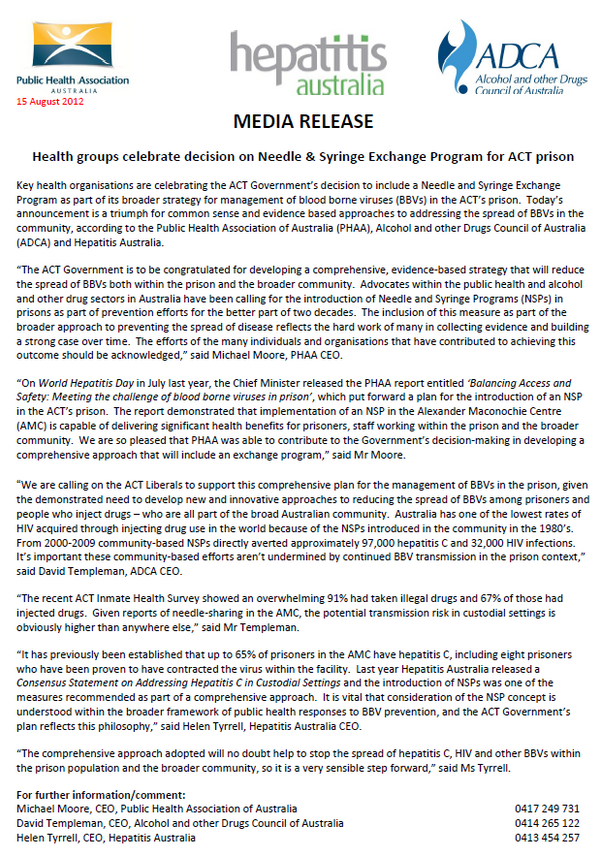Health groups celebrate decision on Needle & Syringe Exchange Program for ACT prison
Key health organisations are celebrating the ACT Government’s decision to include a Needle and Syringe Exchange Program as part of its broader strategy for management of blood borne viruses (BBVs) in the ACT’s prison. Today’s announcement is a triumph for common sense and evidence based approaches to addressing the spread of BBVs in the community, according to the Public Health Association of Australia (PHAA), Alcohol and other Drugs Council of Australia (ADCA) and Hepatitis Australia.
“The ACT Government is to be congratulated for developing a comprehensive, evidence-based strategy that will reduce the spread of BBVs both within the prison and the broader community. Advocates within the public health and alcohol and other drug sectors in Australia have been calling for the introduction of Needle and Syringe Programs (NSPs) in prisons as part of prevention efforts for the better part of two decades. The inclusion of this measure as part of the broader approach to preventing the spread of disease reflects the hard work of many in collecting evidence and building a strong case over time. The efforts of the many individuals and organisations that have contributed to achieving this outcome should be acknowledged,” said Michael Moore, PHAA CEO.
“On World Hepatitis Day in July last year, the Chief Minister released the PHAA report entitled ‘Balancing Access and Safety: Meeting the challenge of blood borne viruses in prison’, which put forward a plan for the introduction of an NSP in the ACT’s prison. The report demonstrated that implementation of an NSP in the Alexander Maconochie Centre (AMC) is capable of delivering significant health benefits for prisoners, staff working within the prison and the broader community. We are so pleased that PHAA was able to contribute to the Government’s decision-making in developing a comprehensive approach that will include an exchange program,” said Mr Moore.
“We are calling on the ACT Liberals to support this comprehensive plan for the management of BBVs in the prison, given the demonstrated need to develop new and innovative approaches to reducing the spread of BBVs among prisoners and people who inject drugs – who are all part of the broad Australian community. Australia has one of the lowest rates of HIV acquired through injecting drug use in the world because of the NSPs introduced in the community in the 1980’s. From 2000-2009 community-based NSPs directly averted approximately 97,000 hepatitis C and 32,000 HIV infections. It’s important these community-based efforts aren’t undermined by continued BBV transmission in the prison context,” said David Templeman, ADCA CEO.
“The recent ACT Inmate Health Survey showed an overwhelming 91% had taken illegal drugs and 67% of those had injected drugs. Given reports of needle-sharing in the AMC, the potential transmission risk in custodial settings is obviously higher than anywhere else,” said Mr Templeman.
“It has previously been established that up to 65% of prisoners in the AMC have hepatitis C, including eight prisoners who have been proven to have contracted the virus within the facility. Last year Hepatitis Australia released a Consensus Statement on Addressing Hepatitis C in Custodial Settings and the introduction of NSPs was one of the measures recommended as part of a comprehensive approach. It is vital that consideration of the NSP concept is understood within the broader framework of public health responses to BBV prevention, and the ACT Government’s plan reflects this philosophy,” said Helen Tyrrell, Hepatitis Australia CEO.
“The comprehensive approach adopted will no doubt help to stop the spread of hepatitis C, HIV and other BBVs within the prison population and the broader community, so it is a very sensible step forward,” said Ms Tyrrell.
For further information/comment:
Michael Moore, CEO, Public Health Association of Australia 0417 249 731
David Templeman, CEO, Alcohol and other Drugs Council of Australia 0414 265 122
Helen Tyrrell, CEO, Hepatitis Australia 0413 454 257
Keep up-to-date with drug policy developments by subscribing to the IDPC Monthly Alert.
Topics
Regions
Related Profiles
- Alcohol and other Drugs Council of Australia (ADCA)
